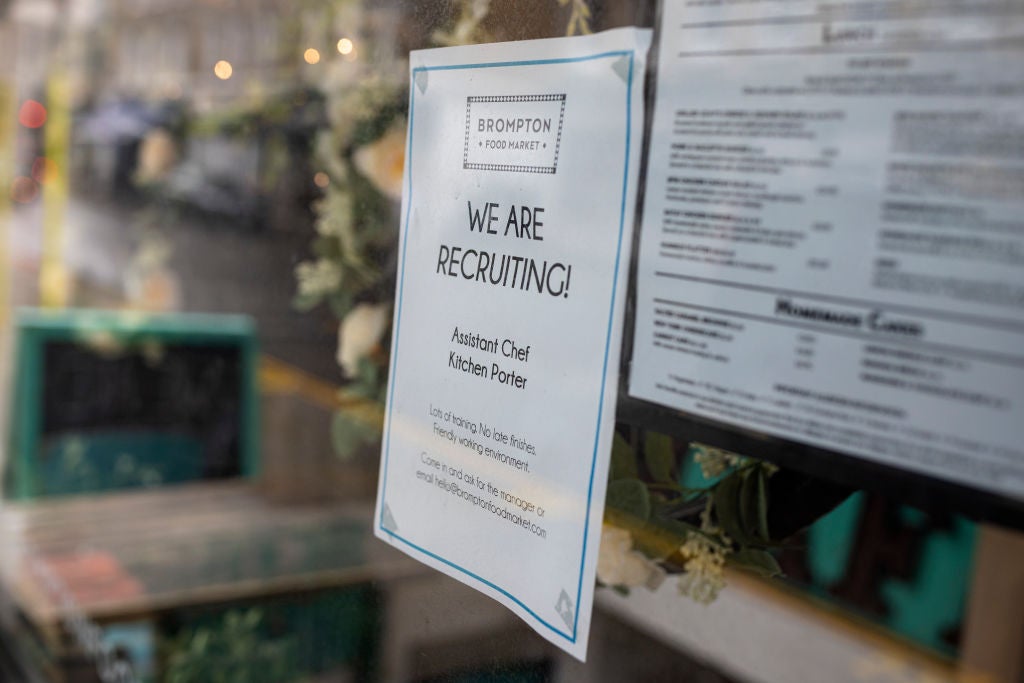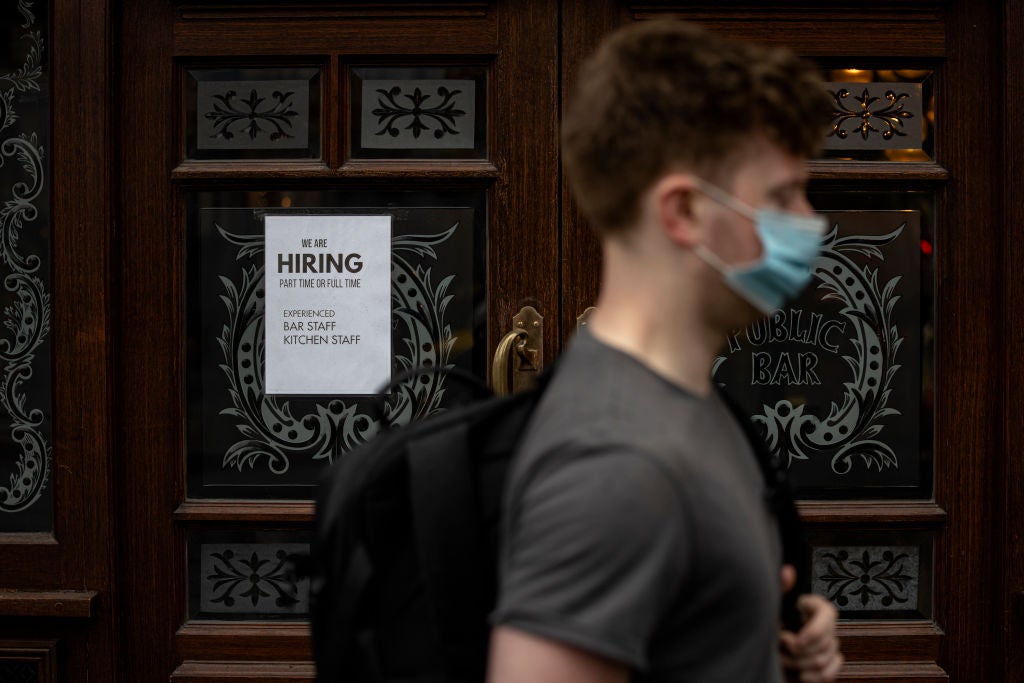Customer experiences are crashing in the post-Brexit hospitality world
Some businesses strived to keep their staff motivated and employed during the pandemic, while others didn’t – and with Brexit to boot, the effects are now being felt by the customer, writes Caroline Bullock


In a line that could have tripped off the tongue of Basil Fawlty, the table behind me was presented with an interesting dilemma: would they be ok with a burnt pizza, or did they want to wait for a fresh one to be made?
The latter option would take a while, though, warned their young server, and the diners wearily plumped for burnt. Amid the chaos of this al fresco cafe, overseen by a trio of apologetic teens, a plate of charred dough for just shy of £14 was deemed preferable to more delays or no food at all.
As a snapshot of post-Brexit UK hospitality, it was a telling indictment of both industry standards and customer expectations. If it’s not already clear from the growing number of hastily chalked ‘Staff Wanted’ signs in pub, restaurant and hotel carparks, the exodus of European hospitality staff has left a substantial void in the sector, and it’s translating into some pretty crushing customer experiences.
According to Fourth, a firm that provides software to the industry, people from EU countries now make up 37 per cent of the workforce in UK hospitality, down from 43 per cent two years ago – a cohort that has long propped up a sector blighted by low wages, poor perceptions and a lack of staff training. If the chaos of Covid masked some of these evergreen issues, a rapidly shrinking labour market increasingly reliant on homegrown workers, who are often missing the skills and aptitude, has exposed them more starkly, as evidenced by the scene in the aforementioned cafe.
Signs around the premises informed customers that there was table service, but you wouldn’t have known it as the well-heeled crowd, ordering margarita cocktails for themselves and babycinos for their offspring, trooped back and forth to the counter for updates on orders either forgotten or incomplete.
Notably, for all the hushed grumbles around the tables, no one actually complained to the staff. Perhaps, after all those barren months of takeaway only, there’s still some gratitude that the cafe was operating at all – plus there would have been little point, as the problem clearly ran deeper than the three teens struggling at the counter. As such, the constant apologies were generally met with tightly controlled responses such as ‘no problem’ – depressingly, as a nation we’ve become too accustomed to this sort of experience, which is another factor that perpetuates this sorry but enduring cycle.
Data revealed that UK restaurants and casual dining firms had recorded almost 30,000 job losses in 2020 as the Covid-19 pandemic drove a 163 per cent jump in redundancies
I recall my own experience as a 16-year-old, untrained waitress at a budget hotel chain, where the menu featured up to 50 dishes, entirely untroubled by seasonality and provenance. I don’t recall receiving much training, other than a basic tour of the kitchen and a cursory look at the till system that I was never trusted to use anyway. Customer service escaped the induction altogether, and despite my being a novice, I was pretty much left to wait multiple tables during a busy evening shift. The roll-call errors that ensued either amused or frustrated my more seasoned colleagues, depending on their own levels of commitment.
One defining incident involved a mistake with a French customer’s gammon steak order, which had been topped with an egg rather than pineapple as requested. It was swiftly rectified in the kitchen – too swiftly for her liking. Rather than a proper replacement, the egg was simply scraped off and chunks of pineapple were emptied from a tin, the juice spilling into some of the yolky residue left behind. Her response when I appeared with this gloopy mess a few minutes later was incredulous, in the manner of someone used to so much better. A quick flick of her hand in my direction, as if swotting away a fly, indicated that I was to leave her alone as I returned to the kitchen.
I was aware that I was serving rubbish, and that, having seen what I’d seen, I would not want to be eating food prepared in that kitchen myself – though none of that troubled me. Far more pressing from my own perspective was the inconsistency of staff management. The young men favoured by the female duty manager, who were routinely assigned to till duty, enabling them to have an easy time of it, slouched against optics and chatted among themselves, while the girls hurried back and forth serving more than 30 tables.
Then there was the undignified ritual of having your bag checked at the end of each shift, just in case you were tempted to pilfer any of the frozen ready-made meals or cheap cutlery. It rammed home the lack of trust and respect, and even then it made me question why any business would employ people in the first place whom they thought were likely to steal. Along with the meagre wages, largely cancelled out by the taxis needed to get me there and back safely at night, this brief brush with the industry wasn’t an experience that made me feel respected, valued, or indeed remotely motivated to work hard and take pride in what I was doing. And has much really changed?

When I interviewed renowned hotelier Robin Hutson, founder of luxury five-star chain Hotel du Vin in the New Forest, Hampshire, and CEO of the Pig Hotels group, he said that a lack of respect is at the core of a troubled industry, in terms of both the disposable way in which staff are treated and the wider perceptions of a nation that doesn’t take catering seriously as a profession. For him, the number of big-name brands that made staff redundant at the start of the crisis rather than use the furlough scheme was telling. Data compiled by the Centre for Retail Research revealed that UK restaurants and casual dining firms had recorded almost 30,000 job losses in 2020 as the Covid-19 pandemic drove a 163 per cent jump in redundancies.
Many of these businesses, said Hutson, are now paying the price for the short-termism in their approach to staff. By contrast, he furloughed the staff that were eligible and topped up the pay packets of those who weren’t, and has been rewarded with their loyalty, having retained a full team. Furthermore, his focus on training and fast progression up the ranks aims to be an antidote to the usual stop-gap churn rate, born out of his own trajectory. He began as a waiter at Claridge’s hotel, eventually founding his own chains; he sold Hotel du Vin for £66m. More need to follow his lead.
At the pandemic’s height, deserved sympathy was heaped on a sector especially inconvenienced by the disruptions that severed trade in the peak festive season and often left businesses with mountains of wasted food and drink. The overriding narrative was one of an industry desperate to reopen its doors and welcome back its sorely missed customers. It’s regrettable, therefore, that instead of a determination to return stronger and more appreciative of what could have been lost completely – and deliver the value and service that a loyal, returning clientele deserve – in all too many cases, complacency and shortcuts still prevail.




Join our commenting forum
Join thought-provoking conversations, follow other Independent readers and see their replies
Comments